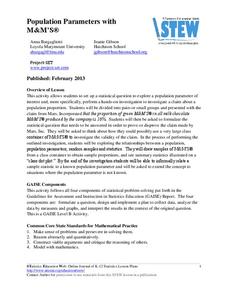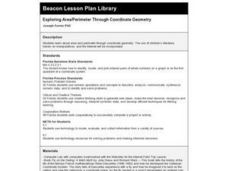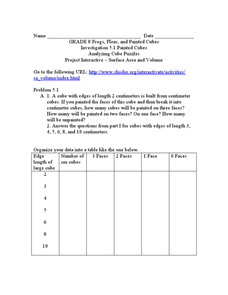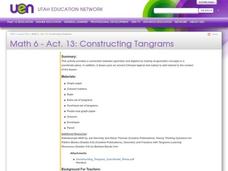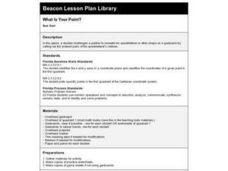EduGAINs
Data Management
Using a carousel activity, class members gain an understanding of the idea of inferences by using pictures then connecting them to mathematics. Groups discuss their individual problems prior to sharing them with the entire class. The...
Utah Education Network (UEN)
Subtracting Integers
Review the concepts of additive inverses and adding positive and negative integers. Relate understanding to the subtraction of integers. This is done with either the use of "Algeblocks" (any square or tile manipulative should do) or a...
Cornell University
The Physics of Bridges
Stability is key when building a bridge. Scholars explore the forces acting upon bridges through an analysis of Newton's Laws and Hooke's Law. The activity asks individuals to apply their learning by building a bridge of their own.
Curated OER
The Effect of Math Anxiety on Cardiovascular Homeostasis
Using a pulse monitor, learners will measure a resting pulse, take a math test, and then measure the pulse again. They analyze the change in pulse and compare it to performance on the test. This multi-purpose lesson can be used in a...
Center for Learning in Action
Density
Explore the concept of density within states of matter—gases, liquids, and solids—through a group experiment in which young scientists test objects' texture, color, weight, size, and ability to sink or float.
Statistics Education Web
Population Parameter with M-and-M's
Manufacturers' claims may or may not be accurate, so proceed with caution. Here pupils use statistics to investigate the M&M's company's claim about the percentage of each color of candy in their packaging. Through the activity,...
EngageNY
Real-World Positive and Negative Numbers and Zero
Class members investigate how positive and negative numbers are useful in the real world. Individuals first read a short passage and identify terms indicating positive and negative numbers. They consider situations involving positive...
American Statistical Association
EllipSeeIt: Visualizing Strength and Direction of Correlation
Seeing is believing. Given several bivariate data sets, learners make scatter plots using the online SeeIt program to visualize the correlation. To get a more complete picture of the topic, they research their own data set and perform an...
Curated OER
Relations and Functions
In this Algebra II worksheet, 11th graders identify the domain and range of a relation and determine if the given relation is a function. The three page worksheet contains explanation and eighteen practice problems. Answers are not...
Curated OER
Spaghetti Bridges
Students thread a piece of spaghetti through the holes in the cup. One person suspend the cup by placing each index finger approximately one inch in from the ends of the spaghetti.
Curated OER
Algebra II: Chapter 7 Test - Systems of Equations
In this systems of equations worksheet, students solve systems of equations, systems of inequalities, and linear equations. They read word problems and write a system of equations that depicts the problem. this two-page worksheet...
Curated OER
The Coordinate Plane
Fifth graders use the attached worksheet, Where's My Location? - Directions, to play a game in which they plot points on a grid.
Curated OER
Introductory Algebra Chapter 8 Review
In this math worksheet, students solve the problems that are correlated with the objectives. Each practice set has an in depth example.
Curated OER
Slippery Slope
Students define patterns, relation and function. In this algebra lesson, students find the slope of a line and write equations of line. They model the slope using real life scenarios.
Curated OER
Exploring Area/Perimeter Through Coordinate Geometry
Students explore area and perimeter through coordinate geometry using student literature, hands-on manipulatives, and the Internet.
Curated OER
Sloping and Intersecting a Linear Function
Pupils examine and discuss typical linear equations, and the difference between a linear and nonlinear equation. They observe examples of linear equations and complete a worksheet.
Curated OER
Analyzing Cubes
In this analyzing cubes worksheet, 9th graders solve and complete 6 different types of problems. First, they organize the given data into the table provided. Then, students study the patterns in the table and tell whether the pattern of...
Curated OER
Constructing Tangrams
Seventh graders visualize and identify geometric shapes after applying transformations on a coordinate plane. In this tangrams lesson, 7th graders construct a set of tangrams and then answer extension questions related to measurement,...
Curated OER
Addition to Solve System of Linear Equations
In this algebra worksheet, students solve system systems of equation. They use addition to solve the problems. There are 6 questions with an answer key.
Curated OER
Guess the Age
Students rewrite word problems using symbols. In this algebra lesson, students rewrite equations graphically, algebraically and verbally. They relate the concepts to the real world.
Curated OER
Where In the World Are We?
Fifth graders read postcards and find their locations on maps. They use the pictures and text on the postcards to write about imaginary vacations. They compute the mileage and compare it to TripMaker data.
Curated OER
What Is Your Point?
Sixth graders identify the x and y axes in a coordinate plane and identifies the coordinates of a given point in the first quadrant. They plot specific points in the first quadrant of the Cartesian coordinate system.
Curated OER
Cartesian Baseball
Learners are told what a coordinate system is and also that it provides a way of uniquely describing each point on a plane or in space. They are given a practice problem along with the equation. Students solve the following problem:...
Curated OER
Worksheet 1: Fibonacci Numbers
In this Fibonacci worksheet, students prove by induction the Fibonacci numbers are recursive. They find a recursive definition for a given set of numbers. This two-page worksheet contains five multi-step problems that involve proofs.







